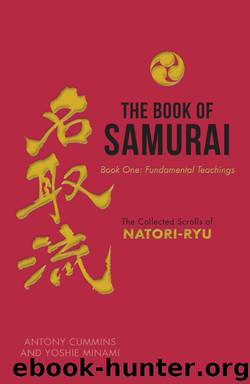The Book of Samurai by Antony Cummins

Author:Antony Cummins
Language: eng
Format: epub
Tags: The Book of Samurai
ISBN: 9781780288888
Publisher: Watkins Media Ltd
Published: 2015-10-08T04:00:00+00:00
CHAPTER THREE
Senba no koto
THE WAR HORSE
Undisciplined horses should be avoided. Remember that Wu Qi said that a horse is more likely to be injured near the start of a war than the end. Military horses should be appropriate to your own ability and you should not ride a horse that you cannot control with ease.
Those horses of a violent temper and which gallop at high speed and cannot stand being in the presence of other horses should not be used in ambushes. However, these horses can be used for other purposes.
Choose fast, strong and robust horses for mounted scouting or when you need to break an enemy formation. Also, use these types of horses for the notification of emergencies. Nothing is as important for a state as its ability to win battles and a key factor in deciding its military success is the quality of its horses. A horse can save a samurai’s life and therefore we should care for them as we would care for ourselves.
Commentator one
A ‘war horse’ means a horse which a samurai rides and which is not a packhorse.
The ‘Managing Troops’ chapter by Wu Qi states:
Normally, horses are injured not towards the end of a war but at the start of one. Similarly, they may become injured not through starvation but through overfeeding.
A horse that is suitable for your strength and that you can control freely should be used. It is detrimental to use a horse you cannot control well. However, there are cases where strong and weak horses can be used appropriately, so do not hold rigidly to this principle. In all cases, only ride horses you can control properly. Generally, if you use a strong horse for jōkan, it will keep energy in reserve. Even so, it is not beneficial to use a horse you cannot control freely, therefore use one suitable for your strength and ability. There have been many examples where those who rode unsuitable horses suffered defeat. At the battle of Ishibashiyama, Sanada Yoichi Yoshisada was killed by Matano Gorō because he was riding a strong horse after he had been weakened by a bout of illness. This episode is found in the Jōsuiki.
There are many examples of a horse saving a samurai’s life. During the battle of Minatogawa of Sesshū, Oyamada Tarō Takaie offered his horse to Nitta Yoshisada and thus saved him from imminent danger. Even though this came about because of the earnest loyalty that Takaie had, it was made possible by the use of a horse. How could Nitta have survived without the horse? This is found in the Taiheiki chronicle. You should take care of horses as you would take care of yourself; that is, you should not leave everything to your servants, but make sure your servants feed them, wash them with hot water, observe them and give them care.
In the chapter ‘Managing Troops’ Wu Qi states:
A stable should be clean and comfortable. Horses should be fed with appropriate grass and water. Feeding should leave them neither too hungry nor too full.
Download
This site does not store any files on its server. We only index and link to content provided by other sites. Please contact the content providers to delete copyright contents if any and email us, we'll remove relevant links or contents immediately.
| Africa | Americas |
| Arctic & Antarctica | Asia |
| Australia & Oceania | Europe |
| Middle East | Russia |
| United States | World |
| Ancient Civilizations | Military |
| Historical Study & Educational Resources |
The Radium Girls by Kate Moore(12012)
100 Deadly Skills by Clint Emerson(4911)
Rise and Kill First by Ronen Bergman(4775)
The Templars by Dan Jones(4679)
The Doomsday Machine by Daniel Ellsberg(4481)
The Rape of Nanking by Iris Chang(4197)
Killing England by Bill O'Reilly(3989)
Stalin by Stephen Kotkin(3955)
Hitler in Los Angeles by Steven J. Ross(3937)
12 Strong by Doug Stanton(3541)
Hitler's Monsters by Eric Kurlander(3327)
Blood and Sand by Alex Von Tunzelmann(3191)
The Code Book by Simon Singh(3172)
Darkest Hour by Anthony McCarten(3117)
The Art of War Visualized by Jessica Hagy(2997)
Hitler's Flying Saucers: A Guide to German Flying Discs of the Second World War by Stevens Henry(2744)
Babylon's Ark by Lawrence Anthony(2670)
The Second World Wars by Victor Davis Hanson(2520)
Tobruk by Peter Fitzsimons(2500)
